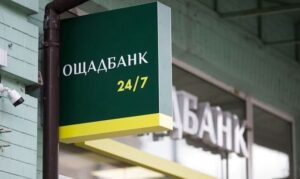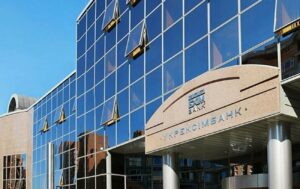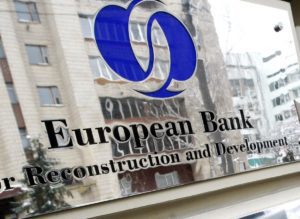
Last week, Oschadbank officially opened its first business hub, Oschadbiznes, in Kyiv and declared it a flagship space for micro, small, and medium-sized businesses (MSMEs).
“Ukrainian businesses need not only loans, but also an environment where ideas, partnerships, and scaling are born. That is why we have created the Oschadbusiness hub, which combines financing, knowledge, and opportunities,” said Serhiy Naumov, chairman of the board of Oschadbank.
The bank noted that the space also provides for educational and business events and has a place for networking.
In turn, Natalia Butkova-Vitvitskaya, a member of the board responsible for SMEs, noted that the hub will operate on a “single window” principle and will become a platform for consultations, participation in grant and partnership programs, as well as access to credit products.
“Next year, the bank plans to expand the Oschadbiznes hub network beyond the capital,” she said, without specifying the number of hubs.
The new branch is located at 26/14 Spaska Street and also includes a premium customer service area.
Oschadbank is the leader in Ukraine in terms of the number of branches—1,142—although in the third quarter, it reduced its network by five branches.
According to Oschadbank, its SME loan portfolio tripled between 2022 and 2025. State grants were received by 25,000 bank customers, and international financial organizations (IFOs) provided approximately UAH 1.5 billion in support. About 20% of the funding was directed to businesses in frontline regions, and half of the customers took advantage of IFO and government guarantee instruments.
As reported, in October 2025, the corporate segment’s loan portfolio grew by 2.6%, or UAH 26.9 billion, to UAH 970.1 billion. Hryvnia loans to businesses added 1.7%, or UAH 11.5 billion, reaching UAH 689.7 billion, while foreign currency loans increased by 4.2%, or $267 million, to $6.68 billion.
According to the National Bank, as of October 1 this year, Oschadbank, with total assets of UAH 485.81 billion, ranked second among 60 banks in Ukraine in terms of this indicator.

Sens Bank plans to significantly increase its SME loan portfolio in 2026, focusing on companies with a turnover of up to UAH 1 billion, said Yana Shumunova, director of the bank’s SME department, in an exclusive interview with Interfax-Ukraine.
“Today, the SME loan portfolio amounts to about UAH 3.2 billion, and liabilities are about UAH 20 billion. We plan to expand service limits to UAH 1 billion in turnover per client and increase the share of credit operations,” she said.
According to Shumunova, a significant portion of the bank’s clients work in the fields of trade, services, processing, agriculture, and logistics.
SENS Bank is a Ukrainian universal bank, formerly known as Alfa-Bank Ukraine. After nationalization in 2022, the bank has been actively developing digital services, corporate lending, and small business support. The bank’s network includes more than 200 branches, with assets exceeding UAH 100 billion.

Investment company Dragon Capital is completing the creation of two new investment funds with a total volume of approximately $609 million, according to the company’s founder and CEO Tomas Fiala.
According to him, the first fund, worth $200 million, will focus on small and medium-sized businesses with a turnover of up to EUR50 million.
“Next month, we will have our first closing at just over $100 million, and the second in 2026, where we will reach $200 million. We are already working on a pipeline of several dozen projects, where we are selecting which companies to invest in, and we are mainly buying majority stakes in companies,” Fiala said at the Global Outlook: Strategic Momentum conference organized by the European Business Association (EBA) in Kyiv on Friday.
According to him, the second fund, worth EUR350 million, will focus on infrastructure investments. Its first project will be in the energy sector, where Dragon Capital has already invested its own funds.
By the end of the year, the company plans to launch 65 MW of generating capacity—batteries and gas piston stations—and is also preparing projects for another 200 MW, which are planned to be implemented by the end of next year.
Fiala also said that last month the company invested more than UAH 300 million in the capital of its bank through subordinated debt. In addition, Dragon Capital invested $30 million in the energy sector in 2025 and expects to attract a loan from the EBRD for EUR21 million by the end of the year to increase its investment in this sector to over $50 million.
At the same time, he noted that private investors are still cautious due to the risks of war, while the main participants in the funds are currently international financial organizations and Scandinavian sovereign wealth funds.
“There are those who are watching, but they will mostly be ready to make the investment itself, either if it is very cheap or after the war, after the truce, because the risks are high that something will fly in — we ourselves had about five of our assets destroyed at the beginning of the war, and even recently,” he added.
Dragon Capital is one of the largest investment groups in Ukraine in the field of investment and financial services, providing a full range of investment banking and brokerage services, direct investments, and asset management for institutional, corporate, and private clients. The company was founded in 2000 in Kyiv. According to founder and CEO Tomas Fiala, the group’s investment portfolio currently includes nearly 50 different companies or real estate projects. Between 2015 and 2021, the company invested approximately $700 million in Ukraine, excluding reinvestments, and plans to invest $100 million in 2025.

The European Investment Bank (EIB) and state-owned Ukreximbank (Kyiv) have signed a Letter of Intent to sign a financial agreement under the Economic Resilience Support Program II project for a total amount of EUR 100 million to finance small and medium-sized enterprises (SMEs), particularly in the energy efficiency and green technology sectors.
According to the bank’s website on Monday, the document was signed on July 10 at the International Conference on the Recovery of Ukraine (URC2025). The agreement is expected to give Ukrainian businesses access to long-term financing on favorable terms.
“Thanks to access to long-term financing, companies will be able to implement environmentally friendly projects, modernize production, and confidently integrate into the EU economic space,” said Viktor Ponomarenko, chairman of the board of Ukreximbank, as quoted in the statement.
According to the press release, the program aims to improve access for small and medium-sized businesses, as well as mid-cap companies, to sources of financing for investment projects and working capital needs. The initiative is expected to contribute to Ukraine’s sustainable economic development, its integration into the EU economy, and the entry of Ukrainian companies into international markets.
Within the framework of the EIB’s Green Initiative, Ukreximbank’s clients will be able to implement projects in the fields of renewable energy, energy efficiency, and the introduction of clean innovative technologies.
According to the NBU, as of April 2025, Ukreximbank ranked third in terms of total assets among 60 operating banks, with UAH 311.8 billion.

State Ukreximbank (Kiev) on March 21 signed an agreement with the Entrepreneurship Development Fund (EDF) to attract on three programs to support Ukrainian enterprises 250 million UAH, the press service of the bank reported on Tuesday.
According to the message, credit resources for Ukreximbank will be provided at the expense of both own funds of the FRD, and the means of the project “SME support”, funded with the support of the German government through the German Development Bank KfW and the EU within the initiative EU4Business.
It is indicated that a significant portion of credit funds is planned to support the financing of small and medium-sized enterprises engaged in export operations, which will contribute to the expansion of national production in world markets.
Ukreximbank was founded in 1992. The only owner of this financial institution is the state.
According to the National Bank of Ukraine, as of November 1, 2022 Ukreximbank by total assets was in 3rd place (267.423 billion UAH) among the 67 operating in the country.

The European Bank for Reconstruction and Development (EBRD) and the European Union (EU) are opening the EU4Business-EBRD credit line with the limit of EUR 60 million to finance projects of small- and medium-sized enterprises (SME) in Ukraine, EBRD Managing Director, Eastern Europe and Caucasus Matteo Patrone said at a presentation of the project in Kyiv on Friday.
He said the credit line with a limit of around EUR 60 million is intended for SME for using opportunities opened in relation with the Deep and Comprehensive Free Trade Area (DCFTA) Agreement signed by the EU and Ukraine.
Patrone said that borrowers using this credit line will be able to receive long-term loans in the amount of up to EUR 3 million. The loans will be issued in hryvnias.
The credit line is integration from the point of geography and economy, he said. After the establishment of the DCFTA between the EU and Ukraine, local companies obtained many opportunities. The launch of the EU4Business-EBRD credit line allows local SME, which provide almost 80% of jobs in Ukraine, but generate only around 40% of GDP, to have an additional access to financing to develop, become more competitive and meet EU standards, Patrone said.
For projects within the EU4Business-EBRD credit line that will meet certain requirements, incentive grants are also provided to cover up to 15% of the cost of projects.
Patrone said that the funds under this credit line will be provided through state-owned Ukreximbank, which received the equivalent of EUR 22 million for this program, and OTP Leasing, which received EUR 10 million in equivalent. Additional credit resources of around EUR 28 million will be available for other local financial institutions to join this program.
Head of the EU Delegation to Ukraine Hugues Mingarelli said during the presentation of the project that similar credit lines are opened to Georgia and Moldova.
The EU is trying to ensure that these credit lines benefit Ukrainian SME, as well as promote economic growth in Ukraine and strengthen economic relations between the country and the EU. In 2018, exports of Ukrainian goods to the EU grew by 15%, while imports of goods from EU by 11.5%, he said. The EU believes that the DCFTA credit lines contribute to the preservation of these positive trends, Mingarelli said.
CREDIT LINE, EBRD, EU, FINANCE, SME